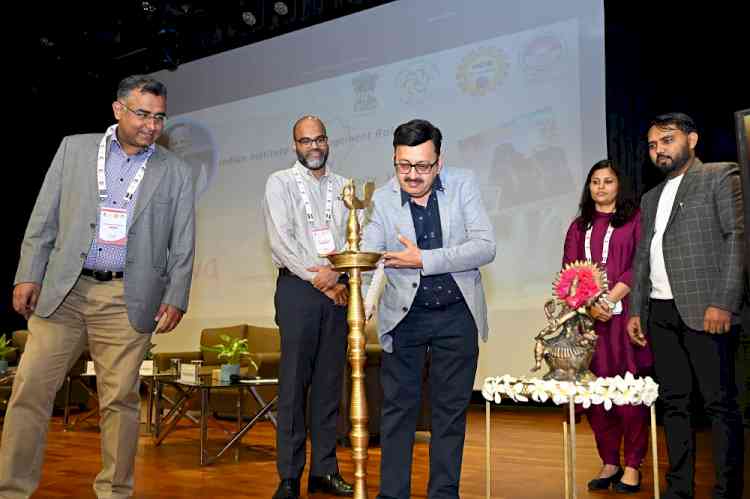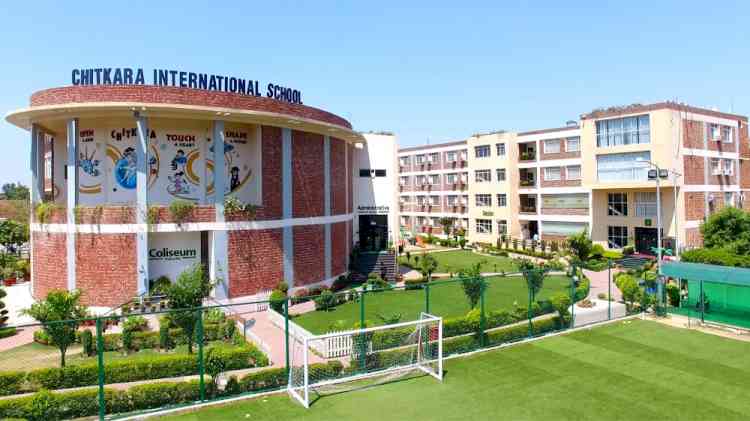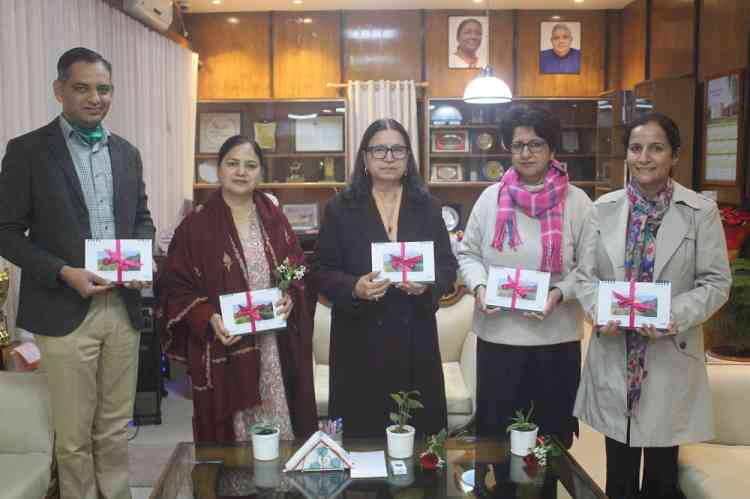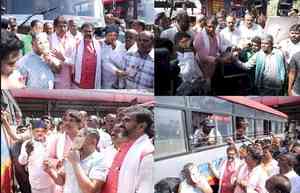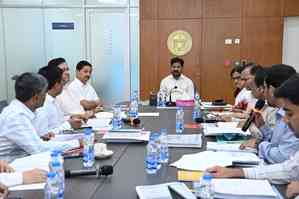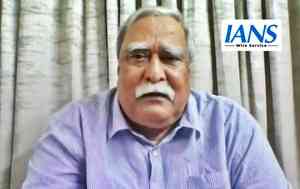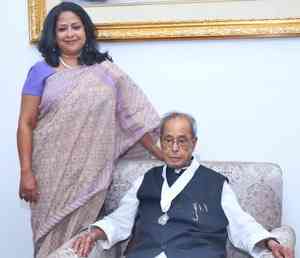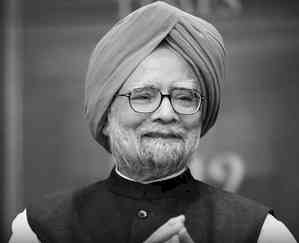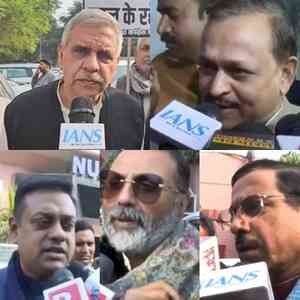Adopt policy of 3Zero: zero poverty, zero unemployment and zero wealth concentration in achieving SDG’s: Prof (Dr) Muhammad Yunus
Nobel Laureate of Peace, Prof (Dr) Muhammad Yunus was speaking at the inaugural session of Five Days Faculty Development Program organised by Amity University Haryana
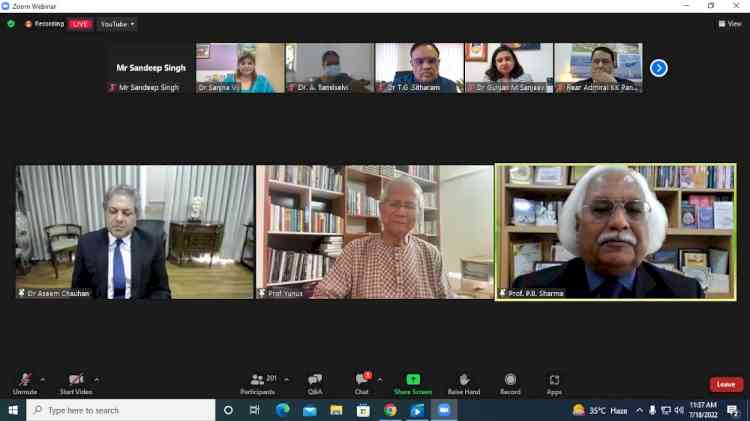
To build sensitivity and develop a holistic and collective approach to the Sustainable Development Goals, SDGs and to secure a better and more sustainable future for all, it is important to identify the role of the colleges and universities in creating both the intense urge as well as mounting meaningful initiatives to achieving the SDGs. Keeping this in mind and to create an opportunity to encourage and motivate teachers abouttheir vision towards a better world, and actions that the teachers and the students together with the university management can take to help achieve these goals by 2030, Amity Academic Staff College of Amity University Haryana, Gurugram has organised a Five Days Faculty Development Program, FDP which was inaugurated today, 18th July, 2022 on the theme: “Universities & Colleges Leading by Example in Attainment of SDG’s: Role of Teachers”.The FDP has been designed to be outcome oriented and highly interactive with online lectures, discussions, presentations, case studies and activity-based sessions.
While delivering the Inaugural Address, today the Nobel Laureate of Peace, Hon’ble Prof (Dr) Muhammad Yunus shared his vision on the importance of universities in contributing to achievements of Sustainable Development Goals. Prof Yunus said “Besides creating and imparting knowledge, the Universities must open the doors to people and become useful to the community and shoulder a greater responsibility for creating the world in which we all wish to live tomorrow”. Citing his own example Prof Yunus said that when he himself became a university teacher for the first time way back in 1974, ‘I asked myself as to how I could be as a teacher to become useful’ to the people and the community around the university. It is this imagination that gives me the strength and the convection that teachers and students together could be highly useful to the people and the surrounding.
This imagination eventually led me to work for creating Gramin Bank and engage in supporting Micro and Small Businesses that became my major passion till date. Prof Yunus was forthright in saying that our current models of economic growth would not be able to meet the attainment of SDGs, as these models of economic growth result in concentration of wealth in the hands of a few, create poverty and cause a great deal of damage to the environment and the planet earth.
Prof Yunus proposed a thorough redesign of our developmental policies and programs to build a new human civilization around the noble concept of 3 Zeros, namely, zero poverty, zero unemployment and zero wealth concentration in achieving the SDG’s.
Prof Yunus invited the university leadership, teachers and students to imagine their role in creating this new world free from poverty, free from unemployment and with all round inclusive development. Prof Yunus highly appreciated the resolve of the Amity Universities to lead in attainment of SDGs in their university campuses.
In his words of wisdom, Dr. Aseem Chauhan, Hon'ble Chancellor, Amity University Haryana highlighted major initiatives taken by Amity Universities in India towards compliance to SDGs. This has enabled Amity University Haryana to achieve the distinction of being the first university in India and the second in Asia to receive the LEED Platinum Certification for its green building designs and for Leadership in Energy and Environment Compliances. The pride of Amity in its sustainable green practices has further been enhanced by the AUH achieving its rank in top 50 (32) for SDG-7 for clean and affordable energy, in top 100 (63) for SDG-6 for Clean Water and Sanitation and in top 200 for SDG-13 relating to combatting climate change and its impact in the World Higher Education Impact Ranking by Times Higher Education in 2022, said Chancellor Dr Aseem Chauhan.
Hon’ble Chancellor invited the university leaders to draw a road map of the University for accelerating attainment of the SDGs and focus on importance of impact rankings so that the universities make a profound contribution to national and global efforts for SDGs.
In his welcome address, Prof P B Sharma, Vice-Chancellor, Amity University Haryana said that we are in highly opportune time to join the government, corporate and the community in accelerating our march on the path of attainment of the SDGs. For this to make a reality we need to revitalize university education for sustainability, inclusive growth and for creating the world of prosperity and happiness together, protecting the interest of man and mother nature. The teachers and the students of the university need to imagine their role in making it happen both by fostering technology innovations and scientific advances, as also By building effective layers of partnership with the society and the community around.
The Guest of Honor, Gayatri Raghwa, Environment Education Consultant, United Nations Environment Program (UNEP), New Delhi in her plenary address discussed the Global Agenda: SDGs, equitable, inclusive, and green growth, a shared vision to end poverty, rescue the planet, and build a peaceful world. She highlighted how, after 50 years, we are at a crossroads of civilization faced with the triple planetary crisis and the declaration of Code Red. "Are we moving towards an equitable and inclusive world by reflecting on the pandemic?" she asked. We need to further ask ourselves as academic institutions, what can we do to foster sustainability?" added Raghwa.
In his thematic address, Guest of Honor, Prof (Dr) T.G Sitharam, Director, Indian Institute of Technology, Guwahati, Assamtalked about ending of poverty and other depravities with the advancement in recent technologies. The more advanced the technology, the lesser would be the poverty. He emphasized on the importance of the quality education, which ensures the inclusive and equitable quality education and promotes lifelong learning opportunities for all.
Mukesh Gulati, Executive Director of Foundation for MSME Clusters, New Delhi talked about the role of MSME Clusters in the growth of India’s Economy as well as in creating employment for many. India has about 6500 Clusters, which can be partnered for desired results to achieve SDG’s. He further added, "Big things always begin with small" and it is development in small things which make them even more meaningful. Once initiatives starts in these ways, the positive impact on the physical world would make.
While elaborating about the Sustainable Development Goals, Guest of Honor, Dr (Mrs.) Pankaj Mittal, Secretary General of Association of Indian Universities (AIU), New Delhisuggested 5 steps that the universities can take to achieve the SDGs. These according to Dr Pankaj Mittal are-Creating Awareness and sensitizing Faculty members & the Students, Research on all 17 SDGs, Add at least one chapter on SDG in the Curriculum, Creating Zero Emission Campuses and Undertake Impact Studies on Govt Initiatives. Universities can prepare the reports, do survey, work on projects where the impact of such schemes are made available and then share these reports with the government agencies so that they utilize these to solve the problems in the areas that matter.
Dipankar Ghosh, Partner at BDO,Lead – Sustainability & ESG, India in his addressstated that sustainable development is no longer a matter of choice but a compulsory aspect to survive and live with dignity. Millenium Development Goals, MDGs gave way to SDGs in 2015. However, SDGs are so much more than MDGs. Each country has a freedom to modify the rules concerning SDGs and in return a wider participation is expected which is happening. 2030 is considered as the decade of action. He urged upon that Gen Z should be better equipped with the knowledge related to sustainable development so that they can think of more innovative solutions about the problems.
Coordinating the event Dr. Sanjna Vij, Program Director, Academic Staff College, AUH said, “In educational institutes, imparting & developing knowledge for sustainable development promotes the knowledge, understanding, skills, values and actions to create a sustainable world. But this action is not achievable without making reference of the teachers since they play pivot role in advancing goals of educational systems which are linked with Sustainable Development Goals. Since teachers are at the heart of the transformation, to do this effectively, they need to be adequately equipped and trained to achieve the targets of SDGs related to Quality Education, Equality, foster innovation, Environmental degradation, Climate change, Industrialization, and Global collaborations”. Rear Admiral KK Pandey (Retd.), AVSM,VSM, Director HR and ASCI, AUH while delivering the Vote of Thanks, highlighted that in a rapidly changing world scenario, the role of universities in attainment of SDGs assumes utmost importance. This Faculty Development Programme is aimed at foster the Faculties knowledge, skills and professional competence. The FDP provides an opportunity for Continuous Professional Development (CPD) to the faculties.
The program was live streamed on amity online and was attended by a large number of VCs, faculty and students from around India and abroad. Dr Rakesh Bhatnagar, Vice Chancellor, Amity University Rajasthan, Dr.Sayalee Gankar, Vice-Chancellor D Y Patil University, Pune, Dr. Vikas Madhukar, DyPVC AUH, Dr Anil Vashisth, Dy Pro VC AUMP, Maj Gen G S Bal (Retd), DSW, Prof Gunjan M Sanjeev, Director, International Affairs, Prof. Rajendra Prasad, Director, AIB and Dean Science and Engineering, Prof Ila Gupta, Director, ASAP and Prof U N Singh, Dean Faculty of Arts, Dr T Padenga Dean HIT Zimbabwe and large number of faculty members and students were also present together-with more than 110 faculty participants who had registered for this maiden Faculty Development Programme from various universities (DY Patil University, SGT University, University of Delhi, SRM University, K R Manglam University, Shoolini University etc) and institutions from across India. Excellent IT support for the program was provided by the Amity IT Team headed by Dr JS Sodhi.


 City Air News
City Air News 
